Introduction
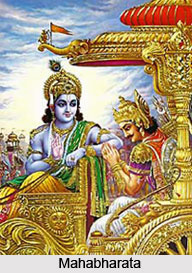 The category branded as Indian literature virtually encompasses the whole of India and its every single aspect, both symbolically as well as realistically. And this certainly is not an overstatement or hyperbole, as writers beginning from the prehistoric age have tried to mirror their society, their times at large, a work to which they have also been successful. Indeed, the thought themes in Indian literature broadly hold within itself a magnificent yet clandestine vision, if viewed in an open angle. To state more precisely, it is generally seen that writers are of the habit to leave their piece of work with an open ending, i.e. , leaving his/her readers to judge the conclusion according to their own wish and understanding. And this where lies that much hidden `success` of the writer, who is forever bound under societal norms when he/she is writing for the present generation. Before beginning with a novel, poetry, short story or play, a writer always has to bear in mind the previous happening in his community and consequences that might occur after the work is published. Hence, the writer never as such can move out from his society and publish an out-of-this-world creation; if such phenomenon ever comes into being, the writer, most likely is to be branded a `social outcaste` or made `incommunicado`. Thus, themes in Indian literature always have to be created keeping in mind the ongoing Indian society or the people associated with it.
The category branded as Indian literature virtually encompasses the whole of India and its every single aspect, both symbolically as well as realistically. And this certainly is not an overstatement or hyperbole, as writers beginning from the prehistoric age have tried to mirror their society, their times at large, a work to which they have also been successful. Indeed, the thought themes in Indian literature broadly hold within itself a magnificent yet clandestine vision, if viewed in an open angle. To state more precisely, it is generally seen that writers are of the habit to leave their piece of work with an open ending, i.e. , leaving his/her readers to judge the conclusion according to their own wish and understanding. And this where lies that much hidden `success` of the writer, who is forever bound under societal norms when he/she is writing for the present generation. Before beginning with a novel, poetry, short story or play, a writer always has to bear in mind the previous happening in his community and consequences that might occur after the work is published. Hence, the writer never as such can move out from his society and publish an out-of-this-world creation; if such phenomenon ever comes into being, the writer, most likely is to be branded a `social outcaste` or made `incommunicado`. Thus, themes in Indian literature always have to be created keeping in mind the ongoing Indian society or the people associated with it.
Now, when elaborated further on this very subject, i.e., Indian literature and its predominating themes, it can be found that a writer, be it of any capability cannot move out form the long-established themes of humanity, like romance, society, tragedy, comedy, adventure, war, or the ancient ones like mythological or epical. Since the ancient Indus Valley Civilization, it has been documented in historical annals that man had favoured to express themselves by speech or letter in the basic overriding conscious emotions stated just above. As such, the ancient Hindu society in India had always favoured and liked to base their writing on mythology and umpteen other legends and folklore, which perhaps was taken to a likeness by ladies and gentlemen both from the mass and the class. As such, mythological themes in Indian literature was the first to capture and enchant Indian readers, dealing with kings, queens, palaces, demons, gorgons, vision of heaven or hell, the Almighty, battles and ultimate winning, also including themes like `never never land` and every sort of non-living thing being animated into a living being. Indeed, these mythological stories had so very appealed and captivated Indian minds, that none of the succeeding generations has ever been able to come out of this everlasting `hypnotic` effect.
Another vital modified version of mythological theme in Indian literature was the rather sophisticated development of epics in Sanskrit literature that was ushered in the Vedic Age. Epic themes in Indian literature began its journey with the two legendary magnum creations Ramayana and Mahabharata, influences and citations of which are still employed by contemporary Indian writers. Thinking in terms of such colossal dimensions called for expert Hindu Sanskrit scholars like sages Valmiki and Vyasa, who were the venerated writers of Ramayana and Mahabharata respectively. In societies that were yet to see modern light of day, these luminaries were capable to take India and Indians towards that modernistic section, that present critics refer to as much ahead of times. Indeed, maximum of later Sanskrit classical literature was based on these two epics, taking themes in Indian literature towards a genre by itself.
Romantic themes in Indian literature was soon to follow the ancient Hindu society, jumping from staunch Hinduism and its priests and borrowing to some extent from west, precisely from its European counterpart. Romance as is known in strict terms in present Indian scenario was far from what was see in those times. Romance necessarily entailed virtually every aspect of life dealing with war, battles, crusades, chivalry, gallantry, relationships with heroic adventure and its knights wooing the princess etc and not only a love affair between a male and a female. Writers were successful to represent every kind of backdrop and link it with romanticism, which just as usual, is espoused by modern Indian regional or English writings. Indeed, contemporary Indian literature has derived out a sophisticated version of romantic theme in Indian literature, dealing again with convoluted versions of social backgrounds and yet falling in place with a perfect balance.
In all these variety of literary genres, it can be witnessed that authorship is mysteriously and productively in line with societal norms, permanently portraying one or the other type of societal variation that has changed with age. Themes in Indian literature during Vedic Age, themes in Indian literature during Classical Age, themes in Indian literature during Medieval Age differs grossly with themes in Indian literature for the contemporary age. As such, social themes in Indian literature, be it in any kind of literal category, wholly falls in place with the structure organisation that humanity dwells in.
Epic Themes in Indian Literature
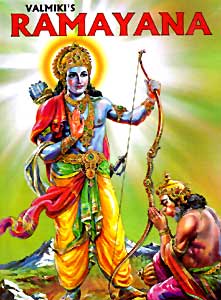 Epic themes in Indian literature basically defines and assays to portray the out and out influence and sway that the ancient literatures had on the subsequent humanity and that which is still going on. The Epic Age can basically be attributed to the times beginning from 1500 B.C. and culminating in 1200 A.D. Hence, before analysing the influence of epic themes in Indian literature, it is first necessary to comprehend the times of Epic India and its culture and customs. This was the very period that is verily titled Golden Age in India, with proliferation, affluence and richness redefining its subjects and populace. The Mauryan Empire was, during the Epic Age, at its helm, with equality and unity in diversity being manifested throughout their territorial reign. When concerned with literature, this was the very genre that had perhaps grown rapidly the most, with Sanskrit literature, commencing from Vedic Sanskrit, had come down in the illustrious line to Classical Sanskrit. However, the two great epics in Hinduism, the predominant religion during that time in the country, Ramayana and Mahabharata had already been scripted, gradually gaining its stronghold with time and its magnificence. The Puranas (also known as the Itihasas), another subsidiary form of epic literature, had also been penned, arresting general attention time and again.
Epic themes in Indian literature basically defines and assays to portray the out and out influence and sway that the ancient literatures had on the subsequent humanity and that which is still going on. The Epic Age can basically be attributed to the times beginning from 1500 B.C. and culminating in 1200 A.D. Hence, before analysing the influence of epic themes in Indian literature, it is first necessary to comprehend the times of Epic India and its culture and customs. This was the very period that is verily titled Golden Age in India, with proliferation, affluence and richness redefining its subjects and populace. The Mauryan Empire was, during the Epic Age, at its helm, with equality and unity in diversity being manifested throughout their territorial reign. When concerned with literature, this was the very genre that had perhaps grown rapidly the most, with Sanskrit literature, commencing from Vedic Sanskrit, had come down in the illustrious line to Classical Sanskrit. However, the two great epics in Hinduism, the predominant religion during that time in the country, Ramayana and Mahabharata had already been scripted, gradually gaining its stronghold with time and its magnificence. The Puranas (also known as the Itihasas), another subsidiary form of epic literature, had also been penned, arresting general attention time and again.
If Indian literature is considered from the commencement of Indus Valley Civilization, it can absolutely be stated that with the advent of the Aryans and the beginning of the Vedic Period, Sanskrit literature was the very first an illustration containing epic themes. Ramayana and Mahabharata by sages Valmiki and Vyasa respectively, had itself ushered in the era and concept of what for the very first time was heard as being `epic`. The magnum opus creation and conception of the authors, the familial relationships and the ties and binds of brothers torn between duty and antagonism, have completely paved way for future generation writers to forever bear epic theme in mind. Then again, moving away from these two cardinal epics, pivoting around which every life is defined; there also exists umpteen and even umpteen epic themes in Indian literature, which have over and over again resorted to seek refuge in Ramayana and Mahabharata. The epical themes post these gargantuan epic verses, have been manifested in Vedic and Classical Sanskrit literature, beginning from the legendary litterateur Kalidasa. His poetical verses in the colossal poetry comprising Ritusamhara, Meghaduta and Kumarasambhava, especially the second instance bear splendid examples of being epic in nature. The rhythmic differentiation of cantos into paragraphs, or the varying metamorphosis of every thought change in further cantos, is wholly depicted Meghaduta and Ritusamhara. Hence, it can be seen that epic themes in Indian literature, besides just being employed in novel are also employed in poetry as well as drama. Yet again, Kalidasa`s plays like Abhijnanasakuntalam, Malavikagnimitra and Vikramorvasiya score over every other Sanskritic litterateurs in India. Indeed, Kalidasa`s employment of language structure, or the format of climax building, has forever interested his trusted readers, forever regarding the writer with esteem.
Epic themes in Indian literature during this Vedic Age again are mirrored in the post-Kalidasa period. Another playwright in Sanskrit literature, Bhasa, wholly was in the habit to base his plays on Ramayana. During the 7th century, Bhavabhuti, the greatest playwright of the post-Kalidasa period, with his two plays, Mahaviracharita and Uttararamacharita, idyllically mirrored the earlier life of Rama as well as his later occurrences. Both the plays, particularly the second one is acclaimed to be one of the finest works in Sanskrit, distinguished by its lyricism and deeply felt pathos. Mention can also be made of Anargharaghava by Murari who existed between the 9th and 10th century. The play had enjoyed significant popularity among the scholars as it is manifested by the sobriquet `Bala Valmiki` (the young Valmiki) bestowed upon him by his loyalists. Rajashekhara, a contemporary of Murari, too had penned a one-act play titled Bala Ramayana, which includes Rama`s coronation as its climaxing event. Rajashekhara indeed wanted to repeat the feat, by taking up Mahabharata as his subject, in his over-ambitious play Balabharata. He however could not complete except two acts, revolving around Draupadi`s wedding and the gambling scene.
Epic themes in later Indian literature can also be evidenced in Tamil, Bengali and Kannada literature, which have thoroughly utilised influences from Ramayana and Mahabharata. It is very much seen that be it in any other later periods, beginning from Classical, Medieval, Later-Medieval, or British rule, people had never successfully been able to shed off the cast of these two magnum creations. Writers time and again, in every regional or English Indian literature, have quoted or been inclined or tempted to rephrase from Vedic Epics. Several examples can be stated in this regard. A true fact that can be mentioned is that, Tamil language was already rich in its lexicon and usage by the time of arrival of later Classical Sanskrit literature. Kamban`s version of the Ramayana had ushered in such an aura and era into the customary Indian writing style, that other gracious and undulating epic worlds were in a big way influenced by him and his penmanship. This factor had played true of all the other poets of his kind too, like Krittivasa of Bengal reiterating Rama`s tale, Kumara Vyasa of Karnataka penning Gadugina Bharata, Sarala Dasa of Orissa metamorphosing the Mahabharata tale to make it quite contemporaneous for his times.
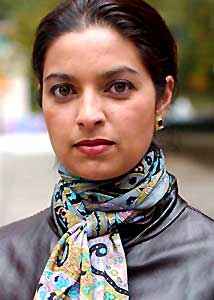 This is precisely the process by which the subsequent Indian population has been blessed with several great narratives based upon Vyasa and Valmiki. Even if only the land south of the Vindhyas is observed, there survives God`s plenty in Indian literature based on epic themes. Marathi literature exudes a pride of its own by the Sisupala Vadh of Bhaskarabhatta Borikar and Murti Prakasa of Keshavraj Suri. Telugu literature surfaces completely in the 11th century with Nannayya`s translation of the Mahabharata. He could however accomplish only the Adi and Sabha Parvas, though. Tikkanna and Yerrapragada had arrived later to finish the pending work. As for Ramayana, there are nearly two hundred and fifty versions existing today, beginning with Gona Budha Reddy`s Ranganatha Ramayana. The trans-creation of the epic by the poetess Molla (16th century) is also justly legendary by its own right. She was the daughter of a potter of Gopavaram, a village close by to Nellore. This was the golden period in medieval literature when some of the finest works in Telugu were compiled.
This is precisely the process by which the subsequent Indian population has been blessed with several great narratives based upon Vyasa and Valmiki. Even if only the land south of the Vindhyas is observed, there survives God`s plenty in Indian literature based on epic themes. Marathi literature exudes a pride of its own by the Sisupala Vadh of Bhaskarabhatta Borikar and Murti Prakasa of Keshavraj Suri. Telugu literature surfaces completely in the 11th century with Nannayya`s translation of the Mahabharata. He could however accomplish only the Adi and Sabha Parvas, though. Tikkanna and Yerrapragada had arrived later to finish the pending work. As for Ramayana, there are nearly two hundred and fifty versions existing today, beginning with Gona Budha Reddy`s Ranganatha Ramayana. The trans-creation of the epic by the poetess Molla (16th century) is also justly legendary by its own right. She was the daughter of a potter of Gopavaram, a village close by to Nellore. This was the golden period in medieval literature when some of the finest works in Telugu were compiled.
However, it is not only classical Sanskrit and regional literature during which epic themes in Indian literature could be witnessed. The present Indian era deserves a special mention in epical influential regard. Indian English writers and their works presently are a great rage with readers, with regional literature not also left far behind. English writers like R.K. Narayan, Shashi Tharoor and his The Great Indian Novel, or writers like Amitav Ghosh, Vikram Seth, Salman Rushdie, Arundhati Roy, Jhumpa Lahiri; poets like Michael Madhusudan Dutt, Kamala Das, Amit Chaudhuri have always loved to blatantly quote their affinity for ancient Indian epics and their everlasting and charismatic concept, depicting a quintessential Indian family or political administration.
Mythological Themes in Indian Literature
 Mythology in Indian context is perhaps the most utilised and most admired for every generation and genre. History bears proof to every fact that Indians from every age, time and place and dynasty have expressed their ardent desire to be enriched and knowledgeable in myths, mythology, legends and folklore. Irrespective of belonging to the contemporary age or being placed in erstwhile era, Indian mythology and its umpteen sections have rested their permanent influence on Indian literature as a whole, which by their own right, can be considered a literary genre itself. Mythology in the Indian context is kind of an all-encompassing and all-inclusive subject, to which everybody wants to be a part of. The traditional, customary and highly esteemed view point of the grandmother-styled art of story-telling has been evolving with time since time immemorial, and this can never be an overstatement. Mythology and their Himalayan twists, turns, thrills, the evil act of a villain-like gorgon and the ultimate triumph of good over evil by the knight in shining armour, together with his rescued kingdom and his beautiful princess, have forever influenced Indian writers, beginning from the Vedic Age. As such, mythological themes in Indian literature are just another common aspect, governing one`s daily life and passion for reading.
Mythology in Indian context is perhaps the most utilised and most admired for every generation and genre. History bears proof to every fact that Indians from every age, time and place and dynasty have expressed their ardent desire to be enriched and knowledgeable in myths, mythology, legends and folklore. Irrespective of belonging to the contemporary age or being placed in erstwhile era, Indian mythology and its umpteen sections have rested their permanent influence on Indian literature as a whole, which by their own right, can be considered a literary genre itself. Mythology in the Indian context is kind of an all-encompassing and all-inclusive subject, to which everybody wants to be a part of. The traditional, customary and highly esteemed view point of the grandmother-styled art of story-telling has been evolving with time since time immemorial, and this can never be an overstatement. Mythology and their Himalayan twists, turns, thrills, the evil act of a villain-like gorgon and the ultimate triumph of good over evil by the knight in shining armour, together with his rescued kingdom and his beautiful princess, have forever influenced Indian writers, beginning from the Vedic Age. As such, mythological themes in Indian literature are just another common aspect, governing one`s daily life and passion for reading.
Mythological themes in Indian literature first bear its most influential and destiny-defying traces in the two epics, Ramayana and Mahabharata. These colossal epics and its umpteen plots, sub-plots and further additional plots make these two stand out from every other mythological series in ancient Indian literature. Indeed, Indian literature is saturated with several types of mythological characters and their portrayal have also been one that that bears relevance very much with the contemporary Indian society. For instance, in Mahabharata, the clash of the titans, Pandavas and Kauravas, or their familial ties and cold-wars, Lord Krishna`s rendition of the Bhagavad Gita to Arjuna, or even, Shakuni`s 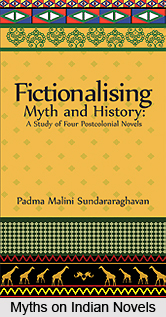 infamous and manipulative game of dice and its consequences owing to sheer greed, makes these episodes stand out manifestly in present Indian context of strife or antagonism with each other. Ramayana too elaborates about lust for kingdom and power and a wife`s devotion to her husband, or a brother`s passionate respect for his elder ones, in the formation of Rama, Sita, Lakshmana or the demon Ravana and his ambition have been hugely celebrated in verse and poetic language, making the writers almost legend and myth-like themselves.
infamous and manipulative game of dice and its consequences owing to sheer greed, makes these episodes stand out manifestly in present Indian context of strife or antagonism with each other. Ramayana too elaborates about lust for kingdom and power and a wife`s devotion to her husband, or a brother`s passionate respect for his elder ones, in the formation of Rama, Sita, Lakshmana or the demon Ravana and his ambition have been hugely celebrated in verse and poetic language, making the writers almost legend and myth-like themselves.
Sanskrit literature, from the Vedic Age has time and again, that too incessantly, have poured out mythological characters and their style of leading life in the hands of writers like Kalidasa, Shudraka, Bana, or Bhasa. Leaving these aside, the Vedic Puranas, or the Upanishads are Indian literature depicting mythological themes in every single line and rhythm. The Puranas, with their almost epic-like storyline and the depiction of the various stratum of society residing, just like the side-by-side dwelling of humans, Gods and demons, do still make of the present age wonder about prowess of men during those supposed imaginary era. All the Hindu Gods, like Brahma, Vishnu, Shiva, Rama, Agni, Vayu, Surya, Varuna or Indra had actually come into existence from the Vedic Period, all of which were contributions of Sanskrit literature; such was the language`s vastness that Sanskritic Age is divided into Vedic Sanskrit, Classical Sanskrit and emergence of modern-day Sanskrit language. Men like Kalidasa with his Meghaduta,Kumarasambhava, Vikramorvasiya or Abhijnanasakuntalam, have tried to concurrently place long lost mythical stories in their exceedingly sublime and ecstatic literature. Mythological themes in Indian literature also are manifested in these Vedic literatures when it is stated that such commonplace human characters wholly make a tête-à -tête with the God-like characters, that too, with ease and in household comfort, a notion quite unimaginable in contemporary Indian times.
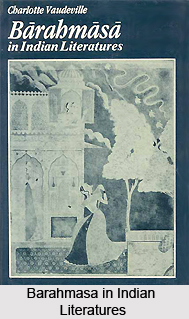 Indeed, Hindu myths and folklore during these Vedic and Classical times are so very saturated with supernatural chronicles, that mythological themes in Indian literature seems only a banality when speaking about these ages and the men living in it; literature by ancient writers were perhaps incomplete and could never be envisioned without invoking God, the Almighty, their wrath and conversations and lastly, the demons, their evil-doings and their curse on humanity. Literary praises, extolments or the concept of invoking was such that it is also believed that these medieval writers were blessed enough to have directly encountered the Almighty`s venerated blessings and divinity in person. Hindu literature also abounds in other variations in mythological influences, with weapons and weaponry arresting a considerable position. Each prince or king is described to have been endowed with the Omnipotent`s special benediction to possess that out-of-this-world tool to fight his adversary. For instance, Arjuna from Mahabharata was known to have been blessed by Lord Brahma Himself, to be gifted with Brahma`s peculiar weapon. The demon king of Lanka, Ravana in Ramayana is also believed to have been blessed by Lord Shiva Himself, lending the king with unusual powers. Coming down to Classical Age, a rather later period in Hindu literature, Vaishnava literature, with the influence of Lord Krishna under Chaitanya Mahaprabhu and his followers have retold umpteen tales of chivalry, romance, moments of annoyance and love games within Krishna and his love interest Radha. The four Vedas themselves: Rig Veda, Yajur Veda, Sama Veda and Atharva Veda, are also known to contain umpteen tales of heroism, bravery, bloodshed, invasions and valorous deeds, that surely only are possible in mythical books, lending additional finery to mythological themes in Indian literature.
Indeed, Hindu myths and folklore during these Vedic and Classical times are so very saturated with supernatural chronicles, that mythological themes in Indian literature seems only a banality when speaking about these ages and the men living in it; literature by ancient writers were perhaps incomplete and could never be envisioned without invoking God, the Almighty, their wrath and conversations and lastly, the demons, their evil-doings and their curse on humanity. Literary praises, extolments or the concept of invoking was such that it is also believed that these medieval writers were blessed enough to have directly encountered the Almighty`s venerated blessings and divinity in person. Hindu literature also abounds in other variations in mythological influences, with weapons and weaponry arresting a considerable position. Each prince or king is described to have been endowed with the Omnipotent`s special benediction to possess that out-of-this-world tool to fight his adversary. For instance, Arjuna from Mahabharata was known to have been blessed by Lord Brahma Himself, to be gifted with Brahma`s peculiar weapon. The demon king of Lanka, Ravana in Ramayana is also believed to have been blessed by Lord Shiva Himself, lending the king with unusual powers. Coming down to Classical Age, a rather later period in Hindu literature, Vaishnava literature, with the influence of Lord Krishna under Chaitanya Mahaprabhu and his followers have retold umpteen tales of chivalry, romance, moments of annoyance and love games within Krishna and his love interest Radha. The four Vedas themselves: Rig Veda, Yajur Veda, Sama Veda and Atharva Veda, are also known to contain umpteen tales of heroism, bravery, bloodshed, invasions and valorous deeds, that surely only are possible in mythical books, lending additional finery to mythological themes in Indian literature.
Besides Hindu literature, mythological themes in Indian literature is also apparent and totally mirrored in Buddhist literature, with the children-friendly Jataka stories and its magical universe. In fact, the solid base as if personified and founder of the sublime religion Buddhism itself, Gautama Buddha, is full of mythical legends. Beginning from Buddha`s birth and ending in his Mahaparinirvana (death of Lord Buddha), mythology has never been far away from India and Indians. Indeed, within Buddhism, Jainism or Islamic religion, minor to major traces of mythological literature have been found in each of the advancing literary sections. The theme of interest however in contemporary times lies with the modern Indian literature and its utilisation of the mythological theme in an extensive sense. This task has too been smoothly accomplished, owing to the ingrained influence of myth and legend to every Indian born in the country or overseas. Every one likes to come back to the Indian context and backdrop when reminiscing their regional literature. Mythological theme in Indian English literature or regional literature has time and again mesmerised and captivated the section of readers in general. The gigantic proportions, the setting, the concept of families residing in a joint method, or the magnum opus work of art, make these contemporary Indian writers stand out in an entirely different genre altogether. As in Arundhati Roy, Amitav Ghosh, Salman Rushdie, or Shashi Tharoor with his The Great Indian Novel, have time and again and recurrently regained stronghold with mythology in their novels. Symbolism and implicit references to mythology is one guiding factor that presently counts in contemporary Indian literature, known to be quite a hit amongst all ages of readers.
Romantic Themes in Indian Literature
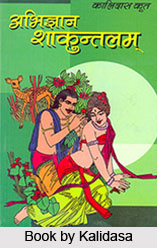 Romance in Indian literature is as old and perhaps as commonplace as Indian history or advent of human civilisation. Since the birth of proper humanity and their establishment of a structured society, man has known and acknowledged romance in their lives, that was integrally linked with verbalisation and scripting of literary quotations. As is known from historical annals, literature in India, during its very initiation, was essentially oral and delivered by the word of mouth. The Vedic trend of gurukul and the guru-shishya process was the primary initiator of this trend, which entailed a young boy travel to his guru`s home and be imparted religious education by his teacher in each occasion. This gurukul mode had, in turn gifted the students to become enlightened in historical romances, although orally. However, in this oral manner, the maximum of these invaluable creations were realised to be lost in time, forever resting in oblivion. Be it tales of religion, adventure, thrill, tragedy, comedy, play, poetry or romance under any form, it gradually dawned on man to pen down these literatures in manuscript, beginning a new era in Indian literary traditions.
Romance in Indian literature is as old and perhaps as commonplace as Indian history or advent of human civilisation. Since the birth of proper humanity and their establishment of a structured society, man has known and acknowledged romance in their lives, that was integrally linked with verbalisation and scripting of literary quotations. As is known from historical annals, literature in India, during its very initiation, was essentially oral and delivered by the word of mouth. The Vedic trend of gurukul and the guru-shishya process was the primary initiator of this trend, which entailed a young boy travel to his guru`s home and be imparted religious education by his teacher in each occasion. This gurukul mode had, in turn gifted the students to become enlightened in historical romances, although orally. However, in this oral manner, the maximum of these invaluable creations were realised to be lost in time, forever resting in oblivion. Be it tales of religion, adventure, thrill, tragedy, comedy, play, poetry or romance under any form, it gradually dawned on man to pen down these literatures in manuscript, beginning a new era in Indian literary traditions.
Romantic themes in Indian literature bear its striking mass majority in Hindu religious literature, which was the one predominating religious faction during the then Indian scenario. As such, Hinduism was one such religion that practically had assimilated every kind literary genre, in the process also influencing every other sphere of life. In this context, as the term `romance` is comprehended in present times, perhaps an after-effect of globalisation, was very much different during ancient Indian times and mood. Romance in literary sections does not necessarily entail about two opposite genders individual falling madly in love and deciding to tie the matrimonial knot, but also encompassing courageous and bold tales of chivalry, battle, preparation to battle, victory, unity of a nation, its political structure and finally, a happy or saddened ending to a fundamental male-female love story. As such, gallantry and courtliness were the primary decisive characteristics that pivoted around romantic literature in ancient India. However, overwhelming romance and exquisite manifestation of it is essayed in the extensive Sanskrit literature, beginning with Kalidasa.
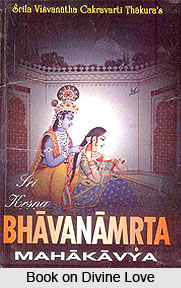 Indeed Kalidasa`s each single creation can be termed as epitomisation of romance and lovelorn lasses and lads, passing through the phase of losing love and further winning it back. The litterateur`s subtle, implicit yet blatant expression dedicated to love and romance, the pathos and drama hidden within each line, is further heightened by Kalidasa`s usage of magnificent overlapping of prose and verse. His Ritusamhara, or even Meghaduta wondrously portrays the romance in seasonal changes and its essential characteristics and its effect upon a lover and his lady in arms. Then again romance is thoroughly established in works of ?hudraka, Bhasa, Asvaghosa, who have religiously sought to emphasise romance in literary works. Romantic theme in Indian literature is also evidenced in the fabled and fairy-tale works like Sanskritic Panchatantra and Hitopadesha, which do contain umpteen tales targeted for the younger and child population, considered a huge hit for all generations that have matured henceforth.
Indeed Kalidasa`s each single creation can be termed as epitomisation of romance and lovelorn lasses and lads, passing through the phase of losing love and further winning it back. The litterateur`s subtle, implicit yet blatant expression dedicated to love and romance, the pathos and drama hidden within each line, is further heightened by Kalidasa`s usage of magnificent overlapping of prose and verse. His Ritusamhara, or even Meghaduta wondrously portrays the romance in seasonal changes and its essential characteristics and its effect upon a lover and his lady in arms. Then again romance is thoroughly established in works of ?hudraka, Bhasa, Asvaghosa, who have religiously sought to emphasise romance in literary works. Romantic theme in Indian literature is also evidenced in the fabled and fairy-tale works like Sanskritic Panchatantra and Hitopadesha, which do contain umpteen tales targeted for the younger and child population, considered a huge hit for all generations that have matured henceforth.
Leaving behind the Sanskritic literary traditions of Vedic Age, romantic themes in Indian literature are also manifested in later literary traditions, which are further even more explicit in regional literature, like Hindi, Bengali, Kannada or Tamil. Going back to several centuries in Indian history, these languages, including Urdu under Islamic rule, had been deduced from Apabhramsa, a faction of Sanskrit. Just as Munshi Premchand in Hindi or Mirza Ghalib or Amir Khusro in Urdu, each has devoted their precious pen to penning romance of epic proportions. The over-the-top descriptions of battles, armoury, the prolonged monologues of the piece`s lead male or female character in war-torn periods, the king and his relationship with his mother or father, in general depictions of nature, flora and fauna, each is painstakingly delineated for the readers to admire for a lifetime. However, the best illustration of romance in Indian literature is evaluated during the colonial rule by British domination in the prolonged 200 year period. With Bengali literature seizing its overriding position during those times, umpteen writers had come to prominence, beginning with Rabindranath Tagore.
Bengali writers like Rabindranath Tagore, Sarat Chandra Chattopadhay, Bankim Chandra Chattopadhay, Tarashankar Bandyopadhay, Bibhutibhusan Bandyopadhay, Ishwar Chandra Vidyasagar, Dinabandhu Mitra, Michael Madhusudan Dutt, Kazi Nazrul Islam or Premendra Mitra, the list never seems to end when concerned with romantic themes in Indian literature. The pre-independence time period, with its bloodshed, loss of lives, protests, sieges, daring and audacious rendezvous by night, nationalist glorification, British hatred - each theme was romanticised to the utmost level in a writer`s hand. Not only did hard-core romance occupy centre-stage, but a freedom fighter`s plight for his/her nation`s freedom was also extolled in near-romanticised and glorified and glamourised verses. Such was Bengali literature`s enigma and circulation spanning the then fired society, that Bengali contemporary authors still base their treatises on these luminaries or make Indian Independence the central theme of their book.
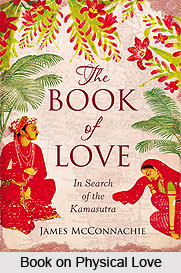 For instance, Tagore`s Gora, Sarat Chandra Chattopadhay`s Parineeta, Tarashankar Bandyopadhay`s Dhatri Devata, or Madhusudan Dutt`s Meghnadbadh Kavya, each incredibly enunciates romance in a different genre, setting, time and place. In comparative later times from Indian Independence, Bengali author Ashutosh Mukhopadhay has successfully been able to capture every single Bengali mind, beginning from the young and ending in grey hairs. Then again, Hindi literature is yet another area, wherein romantic theme rules supreme for Indian literature and its advancement.
For instance, Tagore`s Gora, Sarat Chandra Chattopadhay`s Parineeta, Tarashankar Bandyopadhay`s Dhatri Devata, or Madhusudan Dutt`s Meghnadbadh Kavya, each incredibly enunciates romance in a different genre, setting, time and place. In comparative later times from Indian Independence, Bengali author Ashutosh Mukhopadhay has successfully been able to capture every single Bengali mind, beginning from the young and ending in grey hairs. Then again, Hindi literature is yet another area, wherein romantic theme rules supreme for Indian literature and its advancement.
Beginning from Chand Bardai with his Prithviraj Raso, or Tulsidasa with his Ramacharitamanas, even Kabir and his influence to the Bhakti Movement, romantic theme in Indian literature has always bore an illustrious lineage to royal families and emperors and their queens. Such has been their predomination on Indian society that present Indian writers or the society they try to delineate is generally based upon a romantic backdrop, with a different main plot. R. K. Narayan with his quintessential Malgudi novels, Arundhati Roy with her God of Small Things, Amitav Ghosh with his Shadow Lines, Anita Desai or Ved Mehta, or even Kamala Das with her symbolic poetry, have all in one way or the other have envisioned romance, adventure and gallantry in knightly dimensions. It seems as if that the concept of fairy-tale romance from children`s folk literature has never been able to leave the pan Indian subconscious, which still remains ingrained
Social Themes in Indian Literature
Society is that all-encompassing term which perhaps cannot just be restricted to one single domain of life in general. Indeed, a generalised version of the contemporary society man lives in, gets wholly mirrored in one`s own community, one`s religion, one`s process of consuming food, behaviour towards other members in community, educational style, career one chooses to pursue, or the friends and family one likes to maintain, or just stray instances of communal disharmony in the area. Man`s social order and cultural growth and amalgamation, all are profoundly interlinked in an ecological chain. And there can be no other powerful tool in man`s hand than to portray and document down his own society that writing about it that is intended for the public. In precise terms, this very well can be interpreted to literature and literary formations, with the build up of language structures redefining each different section. The Indian context associated with society has forever been enlisted within historical annals, with social themes in Indian literature letting out priceless information for succeeding ages to successfully comprehend.
Evidence of society in India can be traced for the very time with Indus Valley Civilization, celebrated for their unbelievable structural organisation in each field of life. Indeed, modern Indian society borrows much from Indus Valley and their each work done is still epitomised, such was their perfection in such primitive times. The advent of Aryans to India, concentrating the Dravidians to the south of the country, had yet again significantly influenced societal population at large, with the Vedic Period bearing first stages of literary enunciations. And such was the affluence and prosperity of India during the Vedic Period that practically every domain of each section had improved under the ruling dynasty. Vedic literature beginning with the epics Mahabharata and Ramayana, or the four cardinal Vedas: Rig Veda, Yajur Veda, Sama Veda and Atharva Veda, had begun to exhibit societal concepts of the then Hindu society, covering the whole of India, with special stress on north India. The Vedas, known to contain the Upanishads, the Brahmanas, the Aranyakas, coupled with the Sutras, Puranas, or the Samhitas, had wholly substantiated Hinduism, its rituals, man`s obsession or fanaticism with religious customs and other beliefs that are commonly akin to `prejudice` in contemporary times. Social themes in ancient Indian literature however was not wrong to put these forward, because, Brahmins or rishis who are believed to have penned these down, were out-and-out believers of staunch Hinduism and its after-issues on the faithfuls.
Sanskrit, Pali and Prakrit literature were next in line to depict social themes in Indian literature, post the popularity and acceptance of the Vedas and their supremacy. The over-emphasising of the Almighty, or one`s belief that His wrath would come down if behaving towards the contrary, all pragmatically depict the then Indian society, ruled by Hindus. Time and again, thus Hindu religious efforts need to be cited, because Sanskrit literature was also not far behind in this regard. Be it Kalidasa, ?hudraka, Bhasa, Asvaghosa, Banabhatta, Jayadeva or Kalhana, each Sanskritic genius has desperately tried to portray Indian society through symbolism or mere blatant delineation. The society, its community or the organised humanity as a whole have been exemplified in Sanskrit and its later versions of Pali or Prakrit. Social theme in Indian literature however finds proud mention in Pali literature in Buddhism and its umpteen later studies and canons (like in the Pali Canon of Theravada Buddhism). Buddhism is known to excel in Pali literature; Gautama Buddha`s favoured language of preaching.
Succeeding the Vedic Age and the advent of the powerful Hindu rulers like Harshavardhana, Ashoka and the empires like Gupta, Mauryan, Kamboja, Chola, Satavahana, Kushana or Vijayanagara, each Hindu ruler was fanatically dedicated to making his society the best amongst the whole world. Indeed, literature and literary genres had, for the very first time, started to grow out and be accepted by the common mass. Hindi literature, Tamil literature, Kannada or Telugu literature already had sown its seeds of solid establishment with Dravidian language standing out from its Indo-Aryan counterpart. Forests, dances or religious literature were prominent. Literary genres including romance, fiction, erotica, satire, folk songs, fables and parables, musical treatises and musical compositions were popular. The topics of south Indian literature included grammar, philosophy, prosody, rhetoric, chronicles, biography, history, drama and cuisine, as well as dictionaries and encyclopaedias. Social themes in ancient Indian literature were thus an inevitable concept, trying only to mirror the society with its each central sensitiveness or influence of the west. Significantly, Alexander the Great of Macedonia had invaded eastern Asia during the medieval ongoing Indian epoch, when Hindu rule was at its helm. His influence on the Mauryans or the Kambojas had also been laid bare in literature, bearing symbolic references to this gargantuan personality on the whole.
With social theme being most perfectly and uniformly outlined in ancient Indian literature and under any religion, Medieval India and its Islamic rule was again mirrored in Urdu literature, with all credit going to Persian invasions, which in the long run did have its beneficial effects. Indeed, ancient languages had then taken a backseat with Muslim emperors time and again invading India to make it their domicile. As such, Urdu started to dominate in every sphere, with strict Islamic education being imparted in the Urdu dialect and language. The classical Persian atmosphere is wholly dispensed in Indian literature, with every writer, beginning from Amir Khusro or Mirza Ghalib or Mir Dard and his esteemed successors still going great in verse, play and novels. Magnum romantic themes and palatial edifices are a few of the Islamic themes that have been depicted socially in ancient Indian literature, even assimilating in astronomy in Urdu versions.
The 20th century generation of writers, more precisely the colonial era had picturised British dominated society at large, catapulting social themes in Indian society towards a new direction. Indeed, the very changing face of society in India comes to the closest to perfect depiction during British India and its umpteen literary notables. Bengali literature totally had overwhelmed and overpowered Indian Independence Movements, which time and again are portrayed in books like Nil Darpan (play) by Dinabandhu Mitra, or even Kazi Nazrul Islam`s fuelling patriotic poetry for the nationalists, termed as `revolutionists` by British lords. Every Bengali writer like Rabindranath Tagore, Sarat Chandra Chattopadhay, Bankim Chandra Chattopadhay, Tarashankar Bandyopadhay, Bibhutibhusan Bandyopadhay, Ishwar Chandra Vidyasagar, Dinabandhu Mitra, Michael Madhusudan Dutt, Kazi Nazrul Islam, Premendra Mitra, Bimal Kar or Rajshekhar Basu (Parashuram) had dedicated every genre of Indian literature to the countless crusading martyrs. Be it satire, romance, tragedy, comedy, religious literature or the `angry young man` image, social theme in colonial Indian literature had earned praise from every section of world literary sections.
As a concluding enlistment to social themes in Indian literature, contemporary Indian literary writers of the 21st century made Indians to look at India in yet another direction, letting in much of `cosmopolitanism` and `globalisation`. Indian writing in English, Hindi literature, Bengali literature, Tamil literature, Telugu literature, Gujarati literature, Dalit literature, literature of the North-East, has exclusively dedicated their works in prose, poetry or drama to societal themes in Indian literature. Concerns of administration, communal or religious riots, political unrest, antagonism amongst one community with another, or bright sides like comedy, satire, tragedy, romance with a happy ending, tragic-comic, thriller, investigative series and the likes admired by Indians of all age are just a few of the themes that writers are worried about to produce.
Theme of Realism in Modern Indian Literature
Theme of Realism in modern Indian literature is an outcome of the creation of a reading public which was trying to construct an identity in the context of the anti-colonial struggles and nation-building. This attempt combined liberal-reformist ideology with an affirmation of an `Indian` cultural specificity. This concept of Indian was however middle-class and Hindu. The realist novel`s focus on growth and individual freedom is transformed in the Indian context with the economic conditions of uneven capitalism. Thus the economic, political as well as the social conditions served to provide the basis for Realism in modern Indian literature.
Emergence of Realism as a Theme in Modern Indian Literature
In the field of economics there was seen the existence of capitalist exploitation. There was seen the simultaneous co-existence of the postcolonial state apparatuses with an ideology which was liberal and humanist. This was a markedly seen in the areas of public life, for instance the academic scene. Officially, secularism was seen co-existing with the persistence and reconstituting of mythological symbolics (as in "new" goddesses like Jai Santoshi Ma or the furore over god Lord Rama`s birthplace). Modernizing forces such as women`s education and employment go along with reactionary practices like dowry or sati. It was the existence of these kinds of dual realities which produced a variety of subjects for the Realist novel. All these themes were sought to be represented by the Realist novel.
Various regional crises such as famine (Bengal), peasant and popular uprisings (Tebhaga, Telengana), drought (Tamil Nadu), student and tribal uprisings, and partition constitute traumatic events represented in fiction from many regions.
Writers Dealing With the Theme of Realism
Veena Deo deals with the problems of realist representation for the hitherto excluded groups, such as the Dalits, in her book. Dalit writing becomes significant, for it is an attempt at self-representation of groups that were always considered outside representation.
One of the important dimensions of regional realisms is closely connected with the emergence of women within new constructions of domesticity. The typical nineteenth-century regional novel depicting women seem to represent a kind of conflict between the restrictive social norms and the half-articulated yearnings to achieve selfhood, according to some literary analysts. In general, the scope of this literature was insular and local, mediating a colonial form - realism - with local issues such as child-widowhood in Maharashtra or courtesanship in Lucknow.
Novels of the national movement give women a larger arena for action. In Tamil novelist Kalki`s Thyagabhoomi, (1939-40), for instance, woman`s situation is seen within both the local regional space of Chennai (set in the context of the Congress`s campaign for prohibition) and the larger national space.
The temporary solutions posed by the nationalist era and its attendant euphoria may be read in the happy endings of some early twentieth-century plots: in Thyagabhoomi, for instance, the nationalist movement supplies a (false) resolution to gender conflict. On the one hand, the work uncompromisingly attacks male dominance. The abused wife leaves her husband and earns some autonomy as a leading social figure; yet, in the end, the couple comes together in the prison van, imprisoned as nationalists. Realism in the twentieth century would, among other things, covers greater interregional mobility of both men and women, bringing with it new perceptions of the city and consequent alienations.
Interregional mobility also meant a large reading public for diasporic publications. The pulp periodical magazines, like Kalki, Ananda Vikatan, and Kumudam in Tamil, or organizations like the Tamil Sangam sought to bring regional arts to diasporic populations and catered to the large clerical and professional sectors living outside their regions of origin. In the main, realist narrative also supplied usable raw material for popular film. From Rabindranath Tagore, to Kalki, to Mahasweta Devi (the award-winning film Rudali), realism both humanist and progressive, has contributed to the consolidation of print and film communities.
It could be argued that nineteenth- and early twentieth-century social reform was structurally connected to literary realism just as Gandhian anti-industrialism expressed an Indian version of Romanticism. As activist sections of the middle classes let go of liberal positions for more socially conscious positions in the wake of widespread peasant and communal unrest, liberal realism gave way to more progressive realisms. The manifesto of the progressive writers` association, formed all over India during the 1930s, outlines this commitment.



















